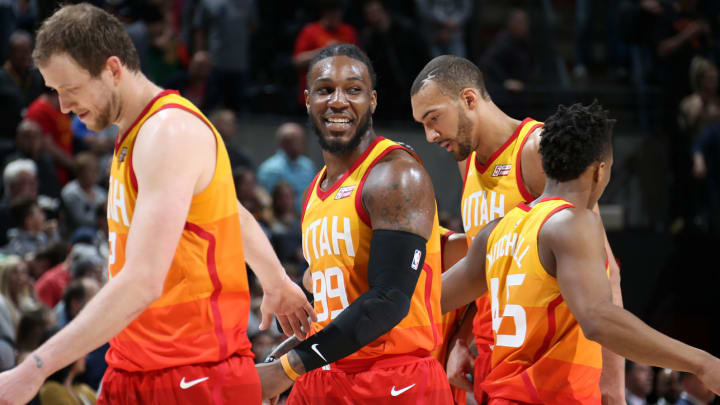The Jazz Defense Reaps the Benefits of Small-Ball

Jae Crowder has worked precisely as intended for the Jazz, which is to say that he offers exactly the kind of optionality they need. The default in Utah is fairly traditional. Derrick Favors, when healthy, still starts every game alongside Rudy Gobert. How those two bigs fare together depends very much on the collection of players around them. With the right mix—and against the right opponent—those two can control a game. With anything less, the gaps and redundancies between them come to bear. Maintaining an offense with two true bigs in the modern NBA is an exacting enterprise. It may not be impossible, but it does mandate a higher level of precision.
Enter Crowder, who in his month and a half with the Jazz has established himself as the stretch four of choice. There has been room in the rotation for such a player all season. When it wasn't Joe Johnson, it was Jonas Jerebko. Crowder has since sealed up the spot with his play alongside the starters—a grouping that has catalyzed an already elite defensive team. The combination of Crowder, Gobert, Donovan Mitchell, Ricky Rubio, and Joe Ingles is literally as stifling as they come; no other qualified NBA lineup this season has allowed fewer than their 80.1 points per 100 possessions, per NBA.com.
Opponents turn the ball over at uncharacteristic rates. They miss with amazing frequency, registering a 39.6% effective field goal percentage. (The NBA's worst offense, the Phoenix Suns, shoots 49.3%). The Jazz don't do anything fancy with Crowder playing power forward—they simply maintain pressure across all matchups in a way that binds even proficient offenses.
It's not exactly a surprise that a lineup of strong team defenders would guard well—only that they've stymied opponents to this preposterous extreme. Credit Gobert, who is so daunting as a shot-blocker as to warp plays in progress. An opponent could run a set to playbook perfection only to have it fly off the rails in Gobert's shadow. Ball-handlers veer away from him, making their moves less explosive and more predictable. Many opponents instinctively over-pass when Gobert is around, giving ball hawks like Rubio and Mitchell all the more opportunity to interrupt. Gobert himself generally defends in conservative fashion, but the swirling pressure of this particular lineup around him creates a frenzy.
The coverage across the board is reliable enough that Gobert isn't often pulled out of position. Blow-bys come at a minimum, which means that the help is always there—walling off areas of the floor from an offense that needs them. And because this group doesn't get stuck making rotation after rotation, all involved are better positioned to rebound and pitted against similarly sized opponents.
The habits on display are impressive. Utah maintains the integrity of its matchups better than almost any team in the league. There are no gaps in the coverage. There are no lazy exchanges. When they switch, they weaponize the tactic by applying constant pressure—stepping up and into any immediate lane. With this lineup in particular, the Jazz walk the line between calculated risk and steadying discipline. They take chances, but somehow without seeming as if they've surrendered even an inch.
It's a challenge to create any real momentum to a possession when a sharp defender is posted at every turn. As a result, opponents are shooting just 49% at the rim against this group – a figure so exceptional it has to regress to the mean. Still, the underlying strength holds: So long as you surround Gobert with players who can hold their own and scramble as needed, he'll turn away most comers:
Gobert manages to buy his teammates time—a commodity made more valuable by the fact that all four are instinctive, high-effort players. Even a single precious second can give someone like Rubio all the time he needs to recover and disrupt a play:
Ingles is frustratingly good at denying the ball and catches opponents off-guard with how well he contests. Mitchell is young but precocious; watch how he squares up against Devin Booker in transition, bringing a fast break to a grinding halt:
And Crowder, for his part, has looked more like himself in his 16 games with the Jazz than he ever did in Cleveland. Defense, more than any other facet of basketball, is subject to feedback loops. Your energy feeds into your teammate's energy, which feeds back into yours. Crowder played a part in the Cavaliers' mid-season malaise, but he was also subject to it—clearly disenchanted by the way no Cav covered for another. It's hard to care about defense whe no one else seems to.
Utah plays with an entirely different ethic, and it shows in Crowder's commitment. He is the material difference. Playing Jerebko in that spot hasn't quite worked. Johnson (who is now a Rocket) was a functional option at the 4, but more limited defensively. Having this version of crowder allows the Jazz to preserve their identity while expanding their horizons. They still have the personnel to bully the Rockets or the Warriors if they'd like. Crowder—and the prospect of a smaller lineup that still plays outstanding defense—simply offers the Jazz another way in.

Rob Mahoney is an NBA writer dedicated to the minutiae of the game of basketball, its overarching themes and everything in between. He joined the Sports Illustrated staff in 2012.